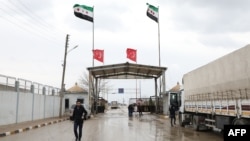The United Nations said late Tuesday that it had reached agreement with the Syrian government on the use of a border crossing from Turkey into northwest Syria.
“The secretary-general welcomes the understanding reached yesterday by the United Nations and the Government of Syria on the continued use for the next six months of the Bab al-Hawa border crossing to deliver life-saving humanitarian assistance to millions of people in need in north-west Syria,” U.N. spokesman Farhan Haq said in a statement.
For the last nine years, the use of Bab al-Hawa was authorized under a U.N. Security Council resolution, eliminating the need for Syrian government permission. In July, however, Russia, which has sought to gradually shutter the U.N. cross-border aid operation, vetoed a nine-month renewal of Bab al-Hawa, which would have gotten aid agencies and residents through the worst winter months.
Damascus later offered to let the U.N. use Bab al-Hawa, but with conditions that humanitarian groups said would have violated their principles of neutrality and impartiality.
The U.N. has been working with the leadership to resolve those obstacles but had not resumed using the crossing while negotiations were continuing.
Haq said the agreement allows the U.N. and its partners to “lawfully” continue providing cross-border humanitarian assistance “at the necessary scale and in a principled manner that allows engagement with all parties for the purposes of seeking humanitarian access and that safeguards the U.N.’s operational independence.”
The U.N. moves about 85% of aid to northwest Syria through Bab al-Hawa, making it vital to its aid operation.
However, the six-month extension means Damascus could cut off access in February at the height of inter.
Haq also said Damascus has given its consent to cross conflict front lines from within Syria at Sarmada and Saraqib for the delivery of assistance for the next six months. While the government wants more cross line aid delivery, it has been slow to give the consents necessary to expand it.
Earlier Tuesday Haq told reporters that the government had extended its permission for the U.N. to use two other crossing points from Turkey into opposition-held areas of northwest Syria for an additional three months.
He said the U.N. received a letter on August 6 from Damascus notifying it of the decision to renew the Bab al-Salam and Al Ra’ee border crossings until November 13.
All three crossings were originally authorized by the U.N. Security Council, overriding any need for the government of President Bashar al-Assad to give its permission. But since 2021, Russia has thrown its support behind the Assad government, which wants to internally control aid distribution, and gradually sought to permanently shut down the council-authorized operation.
The U.N. and aid organizations have repeatedly called for border crossing extensions of at least one year.
“A six-month agreement raises critical challenges for hiring and retaining staff, procuring supplies and delivering services that require much longer than a 6 month guarantee to implement,” said Elias Abu Ata, regional spokesman for the International Rescue Committee. “The extension of an agreement for two additional crossings, initially opened to support the earthquake response for three months, offers little more security.”
More than 4 million Syrians live in areas outside the government's control and the U.N. says it reaches 2.7 million of them monthly with life-saving aid via Bab al-Hawa. The U.N. says distribution of aid across internal front lines cannot adequately substitute for the volume of supplies it brings in via the cross-border operation.





